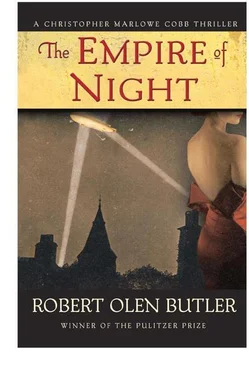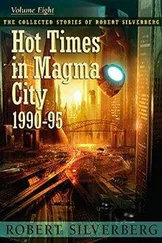He’d simply nodded. We were drinking brandy in the two Morris chairs after everyone else had cleared out of Buffington’s basement bunker.
“This is very risky for her,” I said.
Trask did a lift of the left shoulder and a tilt of the head in the same direction, both equally minute. A characteristic shrug I’d seen more than once. It usually was meant to stop a line of inquiry. But this time he also said, “She understands the risk. She’s made it very clear how disaffected she is with you. I understand she can be very convincing.”
I let that sink in. I tried to believe it. I said, “But why recruit her ? Why take on that extra burden?”
“She was already undercover.”
“I know about that.”
“So I gather.” He smiled, slow and sly. Her Pinkerton work.
“You’re not saying she came to you,” I said.
He shrugged again. This time it did stop the inquiry. But he added, “It could actually make her more interesting to them.”
At that, I should have had a thought about something I’d seen in her dressing room, but I got distracted by her being “interesting” to the Germans.
Trask even followed up on my distraction, though he figured he was simply giving me a more direct answer to my question of why her . He said, “She happened to be the best possible person for our Sir Albert. He is her ardent fan.”
The hops seemed to have vanished. The field passing was full of cows.
I turned back to Mother.
“There is something to say to that.” This came out of my mouth before I realized I was alluding to a thought of a few moments ago that I’d not given voice to: what was there to say to her “Aren’t we having fun.”
“Have I missed something?” she said.
“We can’t take this as fun,” I said. “Of course you knew about me and Trask when I saw you in your dressing room. You knew long before that.”
“So?”
“So what the hell were you doing making a show of my being your son? The stage manager knew me on sight. My photo was stuck in your mirror. You did your underappreciated-and-deeply-concerned-but-proudly-loving-mama act with the suffragettes.”
“I am underappreciated and deeply concerned,” she said.
“Trask surely told you these people are dangerous.”
“I am proudly loving too,” she said.
“Your fate. .”
“Always that,” she said.
“Your fate with the Huns,” I said, firmly, “depends on their belief that we are estranged, you and I.”
“I know that,” she said.
“Then how could you publicly play the opposite?”
“It wasn’t public. This man would never in an eon talk with suffragettes or stage managers. And when he came backstage I hid your photo.”
I flipped my hands in the air in exasperation.
“So Mr. Hunter,” she said, suddenly lighting up in her stage-star way, immediately turning me into this guy. As if that was all it would take to put my concerns to rest. “You and I share some strong sympathies that are, I’m afraid, quickly becoming unpopular in our country.”
She engaged my gaze and she was looking at me with veiled but lively eyes and she was smiling a very small, crooked smile. This pose was filed under Faintly Superior Solicitousness . She was inviting me to get into character with her now. Like old times on a train on the way to a performance.
“Wrongheadedly so,” I said. “This is not the first time our country has had trouble choosing its friends.”
For a very brief moment her smile flashed wide: Isabel smiling at her son Kit playing along with her. Then she plunged back into her playlet. “You are so right, Mr. Hunter. So right indeed. But this weekend you will have a chance to write about the greatest actress of the American stage celebrating her triumph as Hamlet in London and then traveling on to play the tragically fated prince in Berlin. I will, by my art, build a bridge between these two warring nations. I take no sides. I love the English but I also embrace our German brethren.”
“And do you embrace our host this weekend?” I asked.
There was a stopping in her and then a fluttering out of her part, just a little, in her hands. I tried not to show any pleasure at getting her to briefly lose her performance composure. My sense of our old game of this indeed made me feel a sort of pleasure. But for me to have flustered her with that cheap innuendo meant there was some bit of truth in it. And there was no pleasure in that at all.
She recovered quickly. “Mr. Hunter, I never took you for a yellow journalist.”
I played at backing off. “I mean, of course, in the same way you would embrace the good people of Das Deutsche Reich .”
“Well, do forgive me, Mr. Hunter, for misunderstanding you. I am sadly accustomed to young men taking an inappropriate interest in my private life, which is none of their business.”
I turned my face to the windows. The cows had given way to apple orchards, the small, green earlies already beginning to appear.
“We need to talk in our actual selves,” I said.
“And what are those, exactly?” she said.
I looked at her.
Our eyes connected but didn’t hold. She turned her face to the long, even rows of apple trees whisking by. “All right,” she said.
“Your man Albert. .”
“He is not my man,” she said.
“Your target Albert.”
“Yes?”
“What can you tell me about him?”
“I’ve said things about America privately to him that make your little pseudonymous odes to the Fatherland sound wishy-washy.”
“Wouldn’t that make him suspicious?”
“I’m exaggerating.” She said this instantly, shrugging.
“Let’s talk straight,” I said.
“What I said felt that extreme,” she said. “It’s easier for you to write this drivel than it is for me to say it face to face. But I’ve made myself look as potentially good for the German cause as your J. W. Hunter. And I worked up to it. I know how to play that role with a man. Oh, sir, I’ve got this little secret that some people would think unsavory but I feel I can trust you.”
“Sounds effective.” I said this with an edge I didn’t want. She didn’t either. It was her own fault for putting it in those terms.
We looked at each other and silently called a truce.
She said, “I think he believes me. And he was receptive. You could feel him expanding, glowing. But this was just loose, still rather indirect talk. His receptiveness is nothing like proof.”
“There’s one thing I worry about,” I said.
“What’s that, dear?”
“He’ll see a resemblance in us.”
“I don’t think so,” she said.
“The eyes,” I said.
“No,” she said.
“We have the same eyes.”
“Nonsense,” she said. “You have your father’s eyes.”
In those rare occasions she’d let herself refer to him, however vaguely— always vaguely — she meant it to stop the present conversation. She had never identified my father except that his name was Cobb and he was dead and I’d received from him some good traits and some bad traits. Unspecified. To her credit, she had never once, no matter how angry or frustrated she became with me, never once had she invoked my dead Cobb of a father as being responsible for my behavior. And perhaps a dozen times over the years she’d said that the one thing I got from my father were my looks, which she heartily approved of. Just my looks . The eye thing — that they, specifically, were his — this was new. And unwelcome.
I found my next breath hard to take. Impossible to take. And I could hear the clatter of my heart in my ears. Perhaps I had my father’s heart as well. Perhaps he’d died of a heart attack. Perhaps I wouldn’t have to worry about Sir Albert Stockman looking into my face and seeing my mother and smiling and nodding and later telling his men to kill us both in our sleep. Maybe this clatter was my last.
Читать дальше












